Israelis Welcome Biden’s Comments On ‘Death’ Of Nuclear Deal
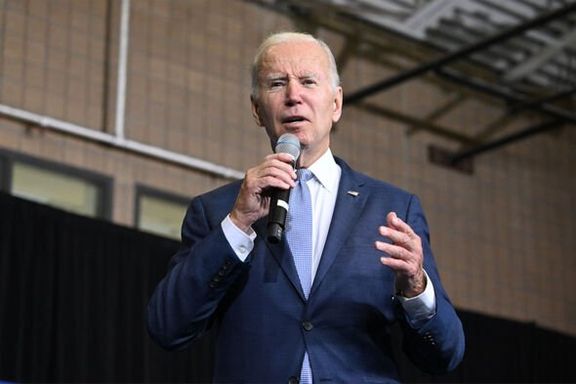
A video of US President Joe Biden saying the nuclear deal with Iran is “dead” has gone viral among Israelis with former premier saying it is “a great achievement for his government”.

A video of US President Joe Biden saying the nuclear deal with Iran is “dead” has gone viral among Israelis with former premier saying it is “a great achievement for his government”.
In a tweet on Tuesday, former prime minister Neftali Bennett said, “Great achievement by our government! Quietly, and through a series of diplomatic and other wise actions, we managed to stop the return to the nuclear deal without confronting the United States.”
“We also brought the fight against Iran’s terrorism (and not just the nuclear program) from Israel's borders to Iran’s soil. We hit the head of the octopus to weaken its tentacles. The new government should continue the same process,” he added.
During an interview with a New York Times columnist on June 21, Bennett talked about his “Octopus doctrine,” saying Israel hits Tehran at the head of the octopus rather than its tentacles that have spread across the region.
Biden’s video, which was published on Twitter for the first time by Damon Maghsoudi, a software engineer living in the United States, was recorded on the sidelines of the November 4th election campaign in California.
In this video, the US President clearly confirmed that the JCPOA is “dead”, but he said he cannot announce it for “a lot of reasons”.
Although Biden does not give a direct answer about the “reasons” why Washington refuses to officially announce this, concerns about Iran’s progress towards obtaining a nuclear weapon could be the main reason for leaving the door open with the Islamic Republic.
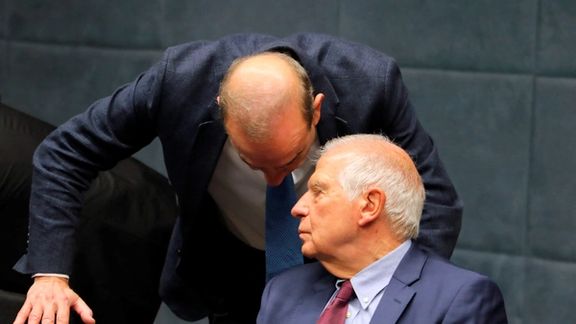
United States officials have played down but not contradicted remarks by President Joe Biden calling the 2015 Iran nuclear deal “dead.”
Shortly before European Union foreign policy chief Joseph Borrell met Iranian Foreign Minister Hossein Amir-Abdollahian in Jordan Tuesday a video emerged on social media late Monday of Biden making the remark on a walkabout November in California during Congressional elections.
Asked about the president’s comments in a press briefing Wednesday, Ned Price, the State Department spokesman, stopped short of endorsing them, saying it was “certainly the case that the Iranians killed the opportunity for a swift return to mutual compliance with the JCPOA.” Security spokesman John Kirby told journalists: “We simply don’t see a deal coming together anytime soon.”
Talks to revive the 2015 nuclear deal, the JCPOA (Joint Comprehensive Plan of Action) floundered in late summer with Iran and the US unable to agree over its restoration. The US, which left the agreement in 2018 and imposed ‘maximum pressure’ sanctions, rejected some Iranian demands as extraneous and unacceptable, without saying what these were.
JCPOA serves ‘security of the whole region’
With the three western European JCPOA signatories – France, Germany and the United Kingdom, the ‘E3’ – close to the US position, diplomatic effort has come from the European Union. Borrell tweeted Tuesday that he had agreed with Amir-Abdollahian on the importance of keeping communications open to restore the JCPOA. In a statement to the United Nations Security Council Monday, Silvio Gonzato, the EU Chargé d’Affaires, said “diplomacy and restoring the JCPOA’s full implementation” were “still the best option” over nuclear non-proliferation and that restoring the JCPOA was “instrumental to the security of the whole region…”
Borrell’s tweet also “stressed need to immediately stop military support to Russia and internal repression in Iran,” so acknowledging the difficulty faced by the EU in maintaining nuclear diplomacy given Iran’s supply of military drones to Russia and its domestic unrest.
The ‘E3’ states were at one this week with the US in arguing at the UNSC that Iran’s supply of military drones violates UNSC Resolution 2231, which in endorsing the JCPOA banned the transfer to and from Iran of certain categories of weapons. Russia and Iran both reject the argument, which the UN is considering.
Wednesday's high-profile visit to Washington of Volodymyr Zelenskyy will see the Ukrainian President argue for more US arms – beyond the $20 billion Washington has supplied. Russia’s use of Iranian-made drones, while not a decisive factor in the war, has strengthened Ukraine’s case for more Western support.
‘Slap Tehran down’
JCPOA opponents in Washington and Israel increasingly deploy Iran-Russia defense links and Iran’s unrest to bolster their case. Mike Pompeo, Secretary of State as the US left the JCPOA, attacked Biden Saturday for any talks with a “brutal and corrupt regime.”Pompeo, who may run for president in 2024, spoke at a conference of the ‘Organization of Iranian American Communities,’ which is allied to the Albania-based Mujahideen-e Khalq.
Yonah Jeremy Bob, senior military correspondent, wrote in the Jerusalem Post Tuesday that UN action against Iran over the drones “could bring back unilateral sanctions crashing down on Iran,” referring to the hope that the alleged JCPOA violation by Iran would trigger US sanctions. This would, Bob argued, “slap Tehran down” and “flip the Biden administration’s policy…in one fell swoop.”
In his press briefing Tuesday, Price said the JCPOA “hasn’t been on the agenda for us for months.” Since September US focus had been both on “Iran’s deepening military partnership with Russia” and on “standing up for the fundamental freedoms of the Iranian people,” the spokesman said.
He agreed that the arrest of actor and “cultural icon” Traneh Alidoost was “part of the regime’s effort to sow fear and to suppress these peaceful protests.” The US has in recent months imposed additional sanctions on Iran over petrochemical exports, ‘human rights,’ and the supply of drones to Russia.

Several US senators have spoken out against the Islamic Republic’s crackdown on dissent and hailing the idea of political sponsorship for Iranian detained protesters.
Florida Republican Senator Marco Rubio told Iran International's Arash Aalaei that “the regime in Tehran feels threatened by peaceful protesters...I think what's the most interesting to see is some clerical dissension.”
Iranians have begun to express the belief that their society should be more open, more transparent, and people have a right to express themselves, he said.
Referring to American lawmakers taking political sponsorship of Iranian political prisoners like their German and Austrian counterparts, Rubio welcomed the idea calling it “innovative.”
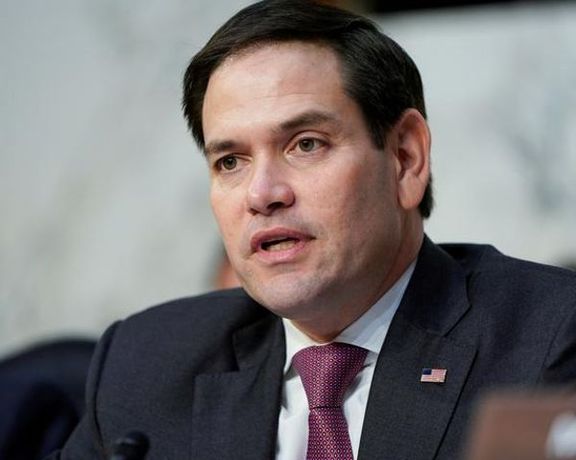
South Dakota Republican Senator Mike Rounds told us that the extent of the crackdown on peaceful protests in Iran is "unfortunate, but when you have this type of regime which clearly doesn't respect life and who wants to maintain power at any cost you have this type of an outcome. It's unfortunate, and the people of Iran deserve better."
Echoing similar remarks, Texas Republican John Cornyn also expressed concern over the crackdowns on peaceful protesters in Iran, saying, “It's not a free country, it's a theocracy. We have been doing as much as we can to support Iranian people against this sort of intolerable backlash."
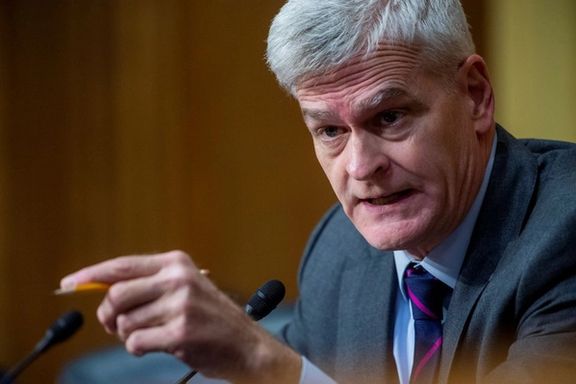
Louisiana’s Republican Senator Bill Cassidy censured the Iranian regime for “killing its own people,” Saying, “We could start with the young woman who was abused in prison to the point where she died. And now we have sights of them shooting with high-power weapons.”
“The regime has lost its legitimacy and it's only being held in force by that oppression. And there's a little bit of an irony: the regime that took the place after a revolution in which the Shah was felt to be no longer a representative of his people, now no longer represents the people,” he added.
He also criticized President Joe Biden for his remarks earlier in the day about not announcing the death of the 2015 nuclear deal.
In a video clip, posted in social media Tuesday, Biden apparently at a campaign walk-about during November’s Congressional elections is asked why he does announce the 2015 nuclear agreement, the JCPOA (Joint Comprehensive Plan of Action) dead, the president clearly replies: “It is dead, but we’re not going to announce it.”
Cassidy said that “Iran has been assassinating people in Europe... So I think there needs to be a hard line not against the Iranian people who are great and incredible people who go back to the Persians and the Medes, but against a government which has ceased to represent those people, and instead has become a force of repression.”
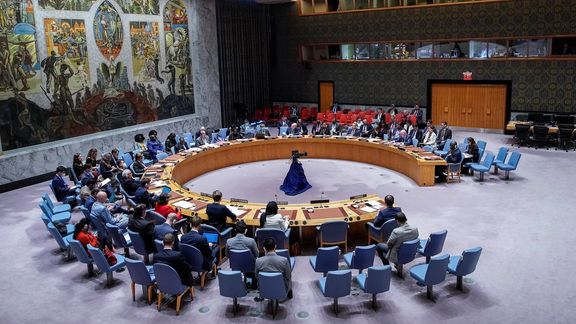
Monday’s meeting of the UN Security Council to discuss the 2015 resolution endorsing the Iran nuclear agreement exposed the complex divisions surrounding it.
Expressing irritation with United Nations Secretary-General Antonio Guterres over an investigation into Iran sending military drones to Russia, United States Deputy Ambassador Robert Wood told the meeting the UN was “apparently yielding to Russian threats” by not sending officials to Ukraine.
UNSC members France, the United Kingdom, and the US have argued that Iran supplying drones to Russia violates a clause in UNSC Resolution 2231, which endorsed the 2015 nuclear deal. The clause requires prior council approval (up to October 2023) for transferring to and from Iran of certain categories of weapons.
Amir Saeid Iravani, Iran’s UN ambassador, said any drones supplied to Russia before February were not banned by the council and were not “for use in the ongoing conflict in Ukraine.” He said the UN enquiry served only “to divert attention from the western states’ transfer of massive amounts of advanced sophisticated weaponry to Ukraine in order to prolong the conflict.” The US alone has sent $20 billion in arms to the Kyiv government.
Iran has not criticized Russia for its unprovoked attack on Ukraine, while the United States and its European NATO allies have strongly opposed Moscow on the issue and are helping Kyiv to reclaim its territorial integrity.
Vassily Nebenzia, Russia’s UN ambassador, told the council that UN officials “should not bow to pressure from western countries” and that “any results of this pseudo investigation [would be] null and void.”
The UNSC meeting marks a growing rift between, on one side, the US, France, and the UK, and on the other side Russia, who alongside China mainly blames Washington for undermining the 2015 agreement, the JCPOA (Joint Comprehensive Plan of Action), which the US unilaterally left in 2018 while imposing stringent sanctions on Iran.
A statement Monday from the three western European JCPOA signatories – France, Germany, and the UK – reiterated that the failure of talks to revive the agreement was solely due to Iran. Their statement said Tehran had “refused to take the deal tabled” by the “JCPOA co-ordinator in March and August,” referring to proposals made by the European Union chair of talks, which Iran regarded as unsatisfactory. The continuing expansion of Iran’s nuclear program was having “severe impacts on international security and the non-proliferation regime,” the ‘E3’ statement said.
JCPOA ‘still the best option’
The EU, whose officials have mediated not just multilateral JCPOA talks but also bilateral Iran-US contacts, now appears more proactive than the E3 over the JCPOA – flying in the face of US President’s Joe Biden just-revealed November proclamation that the JCPOA is “dead.”
EU foreign policy chief Josep Borrell met Tuesday in Jordan with Iranian Foreign Minister Hossein Amir-Abdollahian and chief nuclear negotiator Ali Bagheri Kani. Silvio Gonzato, the EU Chargé d’Affaires, told the UNSC Monday that “diplomacy and restoring the JCPOA’s full implementation” were “still the best option for preventing Iran from developing a nuclear weapon,” and that this was “instrumental to the security of the whole region and…in our fundamental common interest.”
While acknowledging that JCPOA restoration work had been “seriously challenged” by unrest in Iran and the drones supply, Gonzato said the EU “remains in close contact with all JCPOA participants and the United States.”
And while Gonzato noted Iran’s JCPOA infringements, including enriching uranium to 60 percent and limiting international inspectors’ access, Gonzato cited the “very serious negative economic consequences” Iran faced “following the US’s withdrawal from the JCPOA” its “re-imposition of previously lifted US unilateral sanctions, which we deeply regret.”
In Washington Saturday, Mike Pompeo, Secretary of State as President Donald Trump left the JCPOA told a conference there should be no diplomacy with “a brutal and corrupt regime.” Addressing the conference virtually, Maryam Rajavi, co-leader of the Mujahideen-e Khalq, the militant opposition group relocated by the US from Iraq to Albania, said “the current uprising in Iran is one of the world’s most important developments in 2022.”
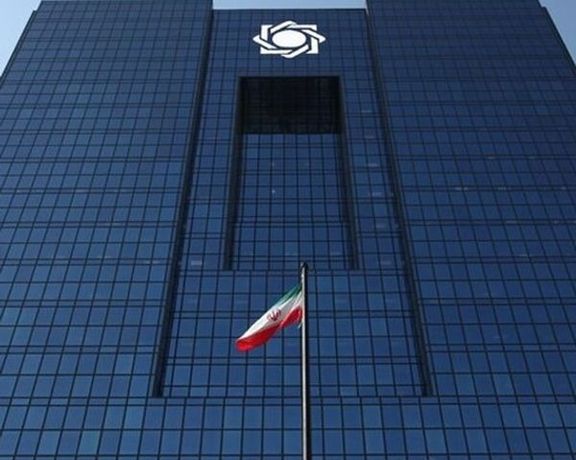
Despite the Islamic Republic's claims that its assets frozen in South Korean banks are about to be released, Iran International has obtained information that the money is still blocked.
According to these documents, the vice president for legal affairs has asked the Iranian banks with blocked assets in South Korean banks as well as in the Seoul branch of Bank Mellat to cooperate in filing a lawsuit to unfreeze the money.
Letters were sent to 16 Iranian banks in September and follow-up letters to nine of them last month, asking them for prompt responses.
Ali Saleh-Abadi, the head of the Central Bank of Iran, said on Monday that the main obstacle in releasing the frozen funds is determining the recipient accounts to which the money would be transferred. He said there were some changes in the recipient accounts.
Every few months, especially when the Islamic Republic’s currency hits new lows against the dollar, Tehran announces that talks are underway with Seoul to free the blocked funds.
Iran, which sits on the world's fourth-largest oil reserves, was a key oil supplier to South Korea, and a main importer of goods such as industrial equipment, household appliances and vehicle parts. Seoul stopped purchasing Iranian oil in May 2019 due to US sanctions that ban the Islamic republic's oil exports.
Bilateral relations between Seoul and Teheran remain frayed after two South Korean banks locked $7-9 billion of Iranian funds owed for oil imports because of US banking sanctions, which were reimposed after former President Donald Trump in 2018 withdrew from the deal.
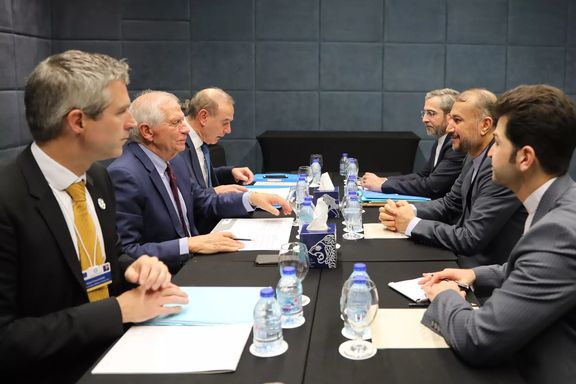
A video of United States President Joe Biden saying the 2015 Iran nuclear deal is “dead” jars with US policy as reiterated recently by leading officials.
In the video clip, posted to social media Tuesday, shows Biden apparently at a campaign walk-about during November’s Congressional elections. Asked about the 2015 agreement, the JCPOA (Joint Comprehensive Plan of Action), the president clearly replies: “It is dead, but we’re not going to announce it.”
This is for “a lot of reasons,” Biden says. Replying to an apparently Iranian woman asking him about “mullahs,” he says he is aware the Iranian government “don’t represent you,” but he adds that if they acquire atomic weapons they will represent a nuclear Iran .
Formal diplomatic efforts to revive the JCPOA, from which President Donald Trump withdrew the US in 2018, have been suspended since late summer. US officials have said JCPOA revival is no longer their “focus,” and Iran envoy Rob Malley in a recent Foreign Policy magazine interview recognized “a series of vicious cycles” in which US sanctions triggered Iran to expand its nuclear program.
But, contrary to what Biden says in the video, US officials have continued to say they want to restore the agreement as the best way to cut off any Iranian path to a nuclear weapon.
Europe: ‘Continue engagement to revive deal’
A week after Josep Borrell said “we have to continue engaging as much as possible in trying to revive this deal,” the European Union foreign policy chief met Tuesday in Jordan with Iran’s Foreign minister Hossein Amir-Abdollahian and chief nuclear negotiator Ali Bagheri Kani. The meeting was at a conference sponsored by France and Iraq aimed at reducing regional tensions. “Necessary meeting…amidst deteriorating Iran-EU relations,” Borrell tweeted.
The European signatories of the JCPOA – France, Germany, and the United Kingdom – criticized the US leaving the 2015 agreement and imposing ‘maximum pressure’ sanctions. But the Biden administration has improved relations with Europe, including by in 2021 joining talks to revive the JCPOA. Contrary to China and Russia, the Europeans have blamed Tehran for failure to bridge US-Iran gaps, as Washington continues sanctions and Tehran seeks ‘guarantees’ to cushion its economy and nuclear program against another US withdrawal. A statement from France, Germany, and the UK issued Monday said Iran had made “unacceptable demands.”
The Ukraine crisis, and media coverage of unrest in Iran, have also pushed Europe closer to the US as both send billions of weapons to the Kyiv government. France, Germany, and the UK have joined Washington in arguing Iran sending drones to Russia contravenes a JCPOA clause barring the transfer of certain weapons to and from Iran.
While Western policy remains to prevent Iran from deciding to ‘go nuclear’ they also realize that at this juncture they cannot enter talks over the JCPOA.
Borrell mentioned two pre-conditions after meeting with the Iranian foreign minister: Tehran should immediately halt military support for Russia and internal repression, conditions the Islamic Republic can hardly meet in foreseeable future.